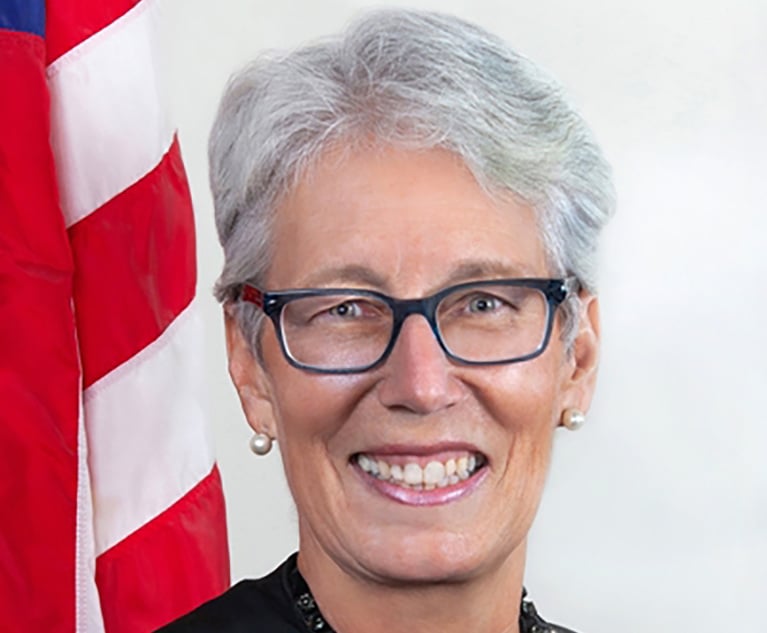 Leo E. Strine
Leo E. StrineStrine's 'Bittersweet' Retirement Announcement May Presage Move to Private Practice, Del. Attorneys Say
In a letter to Gov. John Carney, Strine, who assumed the role of chief justice in 2014, said the decision was "bittersweet," as he expressed gratitude for his 27 years in public service.
July 09, 2019 at 05:20 PM
5 minute read
The original version of this story was published on Delaware Law Weekly
Delaware Supreme Court Chief Justice Leo E. Strine Jr.’s announcement Monday that he plans to retire from his post as the state’s top jurist came as little surprise to many in the state bar, after rumors had swirled for months that he may soon step down.
But the decision was met Tuesday with appreciation for a jurist regarded as one of the state’s top legal minds, as well as speculation about what he might do next.
In a letter to Gov. John Carney, Strine, who assumed the role of chief justice in 2014, said the decision was “bittersweet,” as he expressed gratitude for his 27 years in public service, which also included a stint as legal counsel to former Gov. Tom Carper and 16 years on the state’s influential Chancery Court.
From 2011 to 2014, he served as Chancery Court chancellor, leading what is regarded as the nation’s preeminent tribunal for corporation law and business affairs.
“I am also grateful, governor, that I can say to you with confidence that the Judiciary of this state is strong, that we are addressing our challenging and diverse caseloads with diligence, skill and dispatch, and that we are continually looking for ways to serve the people of Delaware even more effectively,” Stine wrote in the three-page missive, made public Monday by the Administrative Office of the Courts.
Strine, known for both his wit and sometimes prickly demeanor, has expanded the Delaware courts’ initiative to increase access to justice and has tangled with lawmakers in recent years over his efforts to secure state funding for new downstate court facilities and increased pay for judiciary branch employees.
From the bench, he is often a tough and engaged questioner who isn’t afraid to deploy a wry sense of humor to convey a point.
“I did always appreciate his sense of humor,” said Michael P. Kelly, chairman of McCarter & English. “I’ll miss the toe-to-toes comedy contest.”
But mostly, Strine was regarded Tuesday for his contributions to Delaware corporate law, a major selling point for the state that is often cited as the reason why a majority of the nation’s Fortune 500 companies decide to incorporate there.
The two “principal markers” of Strine’s time on the bench, said corporate law professor Lawrence Hamermesh, were his respect for markets and the will of shareholders in deciding corporate matters.
Robert J. Jackson Jr., head of the U.S. Securities and Exchange Commission, said Tuesday that the impact of Strine’s ”expert judgment and wisdom” had been felt well beyond Delaware.
“On behalf of the nation’s investors, I thank the chief justice for his exceptional public service—and look forward to his continued contributions to the development of American corporate law,” Jackson said in a statement
“His impact of Delaware jurisprudence will be felt for generations,” said Francis Pileggi, vice chair of Eckert Seamans Cherin & Mellott’s commercial litigation practice. “On terms of his influence on Delaware corporate law, he’s a giant.”
Rumors about Strine’s future began to spread earlier this year, when he did not hire law clerks for the Supreme Court’s upcoming term. Still, there was little idea of when an announcement might come. When one attorney approached the chief justice in March, Strine played coy and did not directly address questions about his plans, the attorney said.
A spokesman for the courts said Monday that Strine was on vacation and was not available to comment.
The prevailing thought Tuesday was that Strine would likely take a job in private practice, as other former judges on Delaware’s Chancery and Supreme courts have done in the past. Strine, 55, has children approaching college age, which may also play a role in his decisions, sources said.
Strine said in his letter that he planned to officially retire in the fall, in order to give the governor time to name his successor. He said he hoped to leave office on either the last day of September or October because “that is what I’m told is best for the pension office and my family in terms of scheduling my retirement from state service.”
The upcoming opening at the helm of the state’s high court could create other vacancies within the judiciary, if Carney chooses a candidate already serving as a sitting judge.
While Delaware’s two most recent justices came to the court with prior Chancery Court experience, it is not a prerequisite for the job. However, Strine’s successor would be expected to be well steeped in Delaware corporate law, either through judicial experience or expertise in private practice.
“I suppose a betting person would say they’d be looking at that sort of background, but you can get that any number of ways,” Hamermesh said.
The state’s Judicial Nominating Commission, tasked with vetting candidates for judges, is expected to post the opening in the coming weeks. The panel will review the pool of applicants and forward its shortlist of finalists to Carney for his consideration.
Carney’s nominee would need to be confirmed by the Senate during a special session of the Delaware General Assembly expected for the fall.
This content has been archived. It is available through our partners, LexisNexis® and Bloomberg Law.
To view this content, please continue to their sites.
Not a Lexis Subscriber?
Subscribe Now
Not a Bloomberg Law Subscriber?
Subscribe Now
NOT FOR REPRINT
© 2024 ALM Global, LLC, All Rights Reserved. Request academic re-use from www.copyright.com. All other uses, submit a request to [email protected]. For more information visit Asset & Logo Licensing.
You Might Like
View All
Attorneys, Professors Share Support for Chancellor Following Musk's Online Attacks
4 minute read

Jurden Announces 2025 Retirement, Capping 24 Years on Superior Court
3 minute read
Trending Stories
- 1'Largest Retail Data Breach in History'? Hot Topic and Affiliated Brands Sued for Alleged Failure to Prevent Data Breach Linked to Snowflake Software
- 2Former President of New York State Bar, and the New York Bar Foundation, Dies As He Entered 70th Year as Attorney
- 3Legal Advocates in Uproar Upon Release of Footage Showing CO's Beat Black Inmate Before His Death
- 4Longtime Baker & Hostetler Partner, Former White House Counsel David Rivkin Dies at 68
- 5Court System Seeks Public Comment on E-Filing for Annual Report
Who Got The Work
Michael G. Bongiorno, Andrew Scott Dulberg and Elizabeth E. Driscoll from Wilmer Cutler Pickering Hale and Dorr have stepped in to represent Symbotic Inc., an A.I.-enabled technology platform that focuses on increasing supply chain efficiency, and other defendants in a pending shareholder derivative lawsuit. The case, filed Oct. 2 in Massachusetts District Court by the Brown Law Firm on behalf of Stephen Austen, accuses certain officers and directors of misleading investors in regard to Symbotic's potential for margin growth by failing to disclose that the company was not equipped to timely deploy its systems or manage expenses through project delays. The case, assigned to U.S. District Judge Nathaniel M. Gorton, is 1:24-cv-12522, Austen v. Cohen et al.
Who Got The Work
Edmund Polubinski and Marie Killmond of Davis Polk & Wardwell have entered appearances for data platform software development company MongoDB and other defendants in a pending shareholder derivative lawsuit. The action, filed Oct. 7 in New York Southern District Court by the Brown Law Firm, accuses the company's directors and/or officers of falsely expressing confidence in the company’s restructuring of its sales incentive plan and downplaying the severity of decreases in its upfront commitments. The case is 1:24-cv-07594, Roy v. Ittycheria et al.
Who Got The Work
Amy O. Bruchs and Kurt F. Ellison of Michael Best & Friedrich have entered appearances for Epic Systems Corp. in a pending employment discrimination lawsuit. The suit was filed Sept. 7 in Wisconsin Western District Court by Levine Eisberner LLC and Siri & Glimstad on behalf of a project manager who claims that he was wrongfully terminated after applying for a religious exemption to the defendant's COVID-19 vaccine mandate. The case, assigned to U.S. Magistrate Judge Anita Marie Boor, is 3:24-cv-00630, Secker, Nathan v. Epic Systems Corporation.
Who Got The Work
David X. Sullivan, Thomas J. Finn and Gregory A. Hall from McCarter & English have entered appearances for Sunrun Installation Services in a pending civil rights lawsuit. The complaint was filed Sept. 4 in Connecticut District Court by attorney Robert M. Berke on behalf of former employee George Edward Steins, who was arrested and charged with employing an unregistered home improvement salesperson. The complaint alleges that had Sunrun informed the Connecticut Department of Consumer Protection that the plaintiff's employment had ended in 2017 and that he no longer held Sunrun's home improvement contractor license, he would not have been hit with charges, which were dismissed in May 2024. The case, assigned to U.S. District Judge Jeffrey A. Meyer, is 3:24-cv-01423, Steins v. Sunrun, Inc. et al.
Who Got The Work
Greenberg Traurig shareholder Joshua L. Raskin has entered an appearance for boohoo.com UK Ltd. in a pending patent infringement lawsuit. The suit, filed Sept. 3 in Texas Eastern District Court by Rozier Hardt McDonough on behalf of Alto Dynamics, asserts five patents related to an online shopping platform. The case, assigned to U.S. District Judge Rodney Gilstrap, is 2:24-cv-00719, Alto Dynamics, LLC v. boohoo.com UK Limited.
Featured Firms
Law Offices of Gary Martin Hays & Associates, P.C.
(470) 294-1674
Law Offices of Mark E. Salomone
(857) 444-6468
Smith & Hassler
(713) 739-1250






